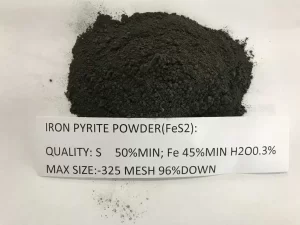As the world shifts towards more sustainable energy solutions, the development of efficient and cost-effective battery technologies has become a focal point. Among the various materials being explored for battery components, iron pyrite powder, also known as fool's gold (due to its golden appearance), has garnered attention for its potential applications in modern energy storage devices. This article delves into the role of iron pyrite powder in the manufacturing of batteries, particularly in lithium-ion batteries and nickel-hydrogen batteries, highlighting its advantages and promising future.

What is Iron Pyrite Powder?
Iron pyrite (FeS2) is a naturally occurring mineral often found in coal mines, sedimentary rock formations, and other geologically active areas. It has a distinctive metallic luster and a brass-yellow color, resembling gold, which is why it is commonly referred to as "fool's gold." Despite its visual similarity to gold, iron pyrite is not valuable as a precious metal, but its chemical properties make it an intriguing material for industrial applications.
In recent years, iron pyrite powder has been investigated for its potential role in energy storage systems, particularly in the realm of battery manufacturing. This powdered form of iron pyrite is composed of fine particles that possess several unique characteristics, making it suitable for various applications in battery technologies.
Applications of Iron Pyrite in Lithium-Ion Batteries
Lithium-ion batteries (Li-ion) are one of the most widely used types of rechargeable batteries, powering everything from smartphones to electric vehicles (EVs). As the demand for higher energy density, longer lifespan, and lower cost increases, researchers are looking for alternative materials to improve the performance of lithium-ion batteries. Iron pyrite powder has emerged as a potential candidate to enhance several aspects of lithium-ion battery performance.
1.Iron Pyrite as Anode Material for Lithium-Ion Batteries
In lithium-ion batteries, the anode plays a critical role in the overall performance and efficiency of the battery. Traditional anode materials, such as graphite, have limitations in terms of energy density and cycling stability. Iron pyrite powder, due to its high specific surface area and abundant sulfur content, has shown promise as an anode material or as part of a composite electrode in lithium-ion batteries.
When used as an anode material, iron pyrite can offer the following benefits:
- High Theoretical Capacity: Iron pyrite has a theoretical capacity that exceeds that of conventional graphite anodes. Its high sulfur content enables the formation of lithium polysulfides during the charge/discharge process, which can significantly improve the energy storage capacity.
- Improved Cycling Stability: Iron pyrite-based anodes exhibit a more stable cycling performance than some conventional materials. This stability ensures that lithium-ion batteries with iron pyrite powder can endure more charge/discharge cycles without significant degradation in capacity.
- Cost-Effectiveness: Iron pyrite is an abundant and low-cost material, making it an economically viable option for large-scale battery production. By replacing more expensive materials like cobalt or nickel, the overall production cost of lithium-ion batteries can be reduced.
2.Sustainability Benefits of Iron Pyrite in Lithium-Ion Batteries
As sustainability becomes an increasingly important concern in battery manufacturing, iron pyrite offers an environmentally friendly alternative. Unlike other materials like cobalt, which are often associated with ethical and environmental issues, iron pyrite is more abundant and easier to obtain with less environmental impact. This could help drive the development of more sustainable lithium-ion batteries, especially as demand for energy storage continues to rise.
Iron Pyrite in Nickel-Hydrogen Batteries
Nickel-hydrogen (Ni-H2) batteries are another type of rechargeable battery that have been used primarily in aerospace and other high-reliability applications. They offer advantages in terms of long life and performance in extreme conditions. Similar to lithium-ion batteries, nickel-hydrogen batteries rely on the interaction between specific electrode materials to store and release energy. Here too, iron pyrite powder has the potential to enhance performance.
1.Enhancing Nickel-Hydrogen Batteries with Iron Pyrite
Nickel-hydrogen batteries require efficient and stable electrode materials to ensure the longevity and effectiveness of the energy storage system. While nickel and hydrogen are central to the chemistry of these batteries, adding iron pyrite powder as part of the electrode materials can offer significant improvements.
- Enhanced Electrochemical Performance: Iron pyrite can help improve the overall electrochemical performance of nickel-hydrogen batteries by offering better charge/discharge kinetics, leading to faster charging times and improved overall efficiency.
- High Energy Density: By incorporating iron pyrite into the cathode or anode, researchers have found that the overall energy density of nickel-hydrogen batteries can be increased. This is particularly important in applications where space and weight are critical factors, such as in aerospace.
- Increased Battery Life: The incorporation of iron pyrite has been shown to enhance the cycle life of nickel-hydrogen batteries. The material's stability over multiple charge/discharge cycles helps to minimize degradation, thereby extending the battery's useful life.
2.Cost Reduction and Availability of Iron Pyrite in Ni-H2 Batteries
Nickel-hydrogen batteries are often more expensive than other types of batteries due to the high cost of the materials involved, including the nickel and hydrogen components. Iron pyrite, being an abundant and inexpensive mineral, could help reduce the overall cost of nickel-hydrogen batteries, making them more accessible for use in a broader range of applications.
Advantages of Iron Pyrite Powder in Battery Technologies
The use of iron pyrite powder in both lithium-ion and nickel-hydrogen batteries presents several significant advantages that could lead to more efficient, sustainable, and cost-effective energy storage systems. These benefits include:
1.Abundance and Low Cost of Iron Pyrite
Iron pyrite is one of the most abundant minerals on Earth, making it a cost-effective alternative to more expensive and less abundant materials commonly used in batteries. The low cost of iron pyrite could make batteries cheaper to produce and more affordable for consumers, facilitating the widespread adoption of renewable energy technologies and electric vehicles.
2.Environmental Benefits of Iron Pyrite in Battery Manufacturing
The environmental impact of mining for materials like lithium, cobalt, and nickel is a growing concern. By using iron pyrite as a primary or secondary material in battery production, manufacturers can reduce the environmental footprint of their products. Iron pyrite is more abundant and easier to extract than many other battery materials, reducing the reliance on rare or conflict minerals.
3.Enhanced Performance with Iron Pyrite in Batteries
Iron pyrite offers improved energy density and cycle stability compared to conventional battery materials. This translates into batteries that can store more energy, last longer, and deliver better performance over time. Additionally, iron pyrite-based batteries can offer faster charge times and better overall efficiency, which are key considerations for consumer electronics, electric vehicles, and other energy storage applications.
4.Sustainability and Recyclability of Iron Pyrite-based Batteries
With the growing demand for energy storage solutions, sustainability is a crucial factor in the development of new battery technologies. Iron pyrite is a material that can be sustainably sourced, and because it is abundant, it poses fewer risks of supply chain disruptions. Furthermore, iron pyrite-based batteries can be more easily recycled, reducing waste and environmental impact at the end of their life cycle.
Conclusion: Iron Pyrite’s Promise in the Future of Energy Storage
Iron pyrite powder is a promising material in the ongoing evolution of battery technologies. Whether in lithium-ion batteries or nickel-hydrogen batteries, the unique properties of iron pyrite—such as its abundance, low cost, and superior electrochemical performance—offer compelling advantages for improving energy storage solutions. As researchers continue to explore and refine its applications, iron pyrite may become an integral part of the next generation of sustainable, high-performance batteries. By embracing innovative materials like iron pyrite, the battery industry can take a significant step towards meeting the growing global demand for clean, efficient, and affordable energy storage solutions.
If you want to choose high-quality pyrite powder, runlong is definitely your best choice. As a high-quality pyrite powder manufacturer, runlong can provide you with high-quality services and excellent products. Welcome to contact us to get high-quality pyrite powder!

Frequently Asked Questions (FAQ)
- Q1: What are the benefits of using iron pyrite powder in lithium-ion batteries?
- Iron pyrite powder enhances the energy density, cycling stability, and cost-effectiveness of lithium-ion batteries, making them more sustainable and affordable.
- Q2: Can iron pyrite powder improve the performance of nickel-hydrogen batteries?
- Yes, iron pyrite improves electrochemical performance, increases energy density, and reduces the overall cost of nickel-hydrogen batteries.
- Q3: Is iron pyrite environmentally friendly for battery production?
- Yes, iron pyrite is abundant, cost-effective, and has a smaller environmental footprint compared to materials like cobalt and nickel.
